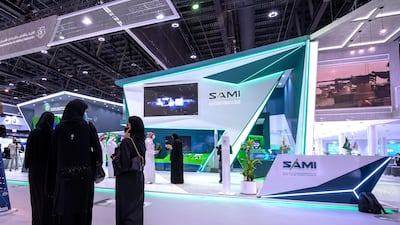Saudi Arabian Military Industries aims to generate $5 billion in annual sales by 2025 as it looks to become one of the top 25 defence companies worldwide.
The state-run company expects to win new contracts in the kingdom, establish strategic partnerships with top industry players and acquire more local targets, chief executive Walid Abukhaled told The National on the sidelines of Idex 2021 on Sunday.
Saudi Arabia’s sovereign wealth fund, the Public Investment Fund, created Sami in 2017 to help reduce the kingdom’s reliance on foreign arms.
As part of the country’s Vision 2030 plan for economic diversification, Sami’s mandate is to ensure more than half of the kingdom’s total military budget is spent locally by the next decade.
While last year was difficult for many businesses worldwide due to the Covid-19 pandemic, Sami said it managed to lay the groundwork for future expansion.
The company said it won strategic projects, moved into its new headquarters and acquired Advanced Electronics Company, an electronics research and defence technology specialist.
“At Sami we had a brilliant 2020. There were so many achievements made in 2020 that set a very solid foundation for growth and prosperity in 2021 and beyond,” said Mr Abukhaled.
“[We] were able to build a very healthy pipeline of business opportunities with our customers across all armed forces.”
Sami is optimistic about growth prospects this year as it seeks to win contracts from the kingdom’s armed forces and navy, with new opportunities spanning land, weapons and ammunitions, aeronautics, defence electronics and naval capabilities.
Mr Abukhaled expects the company to win some of these contracts in the first half of the year.
“We will be winning some strategic contracts in 2021 because we have the foundation now. We have the right team and we have AEC,” he said.
“2021 looks very positive, it looks bright and I am extremely optimistic that my leadership team can deliver.”
Mr Abukhaled, who was named chief executive last year, said he brought forward the company's plans to be among the top 25 defence companies, moving the timetable from 2030 to 2025.






















After winning its first big contract last year, the company’s revenue stands “above 2bn riyals a year”, he said.
Sami is also seeking inorganic growth as it evaluates the potential acquisition of strategic local companies.
“We are looking to establish strategic partnerships with the best of the world’s OEMs [original equipment manufacturers] when it comes to defence and aerospace, and also to continue to look for acquisitions in the kingdom,” he said. “They will be announced soon.”
Sami's acquisition of AEC last year was the largest deal in Saudi Arabia’s military industries sector. It already has partnerships with France’s L3 Technologies, Thales, Belgium’s CMI and Spain’s Navantia.
Asked about the potential to export Saudi-produced defence equipment and the timetable, Mr Abukhaled said demand in the kingdom was huge.
"The Saudi customer is one of the important customers globally, so I owe it to them to satisfy their demand locally before I go abroad,” he said.
However, Sami has ambitions to become part of the global defence supply chain through agreements with new and existing partners.
“We are working closely with our partners that we established joint ventures with, on how they can add Sami’s companies into their global supply chain so that things that are done in the kingdom can also make it globally,” he said.
He cited existing partnerships with Thales and other companies.
“There are a couple more you will hear about in the first half of 2021 and they will all play a key role in enabling Sami to be part of the global supply chain,” he said.
Sami is also investing in emerging technology through a specialist unit as it keeps pace with client demands to use advanced technology in defence equipment.
“We have a special division called emerging technology. Their ultimate objective is to look at trends in defence technology and to ensure that we are well-positioned to cater to this technology when the customer requires it,” he said.
“So, from that perspective, we are positioning ourselves extremely well to be able to win this sort of business when the customer demands it.”
That includes looking at land, aeronautics, defence electronics and naval systems and “anything we can localise; we will be looking to do so with our partners or with our affiliates in Sami”.
As it builds its capacity for local production over the next few years, Sami will be exploring unmanned aerial vehicle, aeronautics and rotorcraft projects, among others, he said.
Saudi Arabia plans to localise half of its military spending by 2030.
“We are extremely ambitious. Our commitment is we want to do more by 2030. We are talking above 50 per cent and we will try to average[it] to a minimum of 60 per cent,” he said.
“Every project we get into there has a minimum of 50 per cent localisation.”



